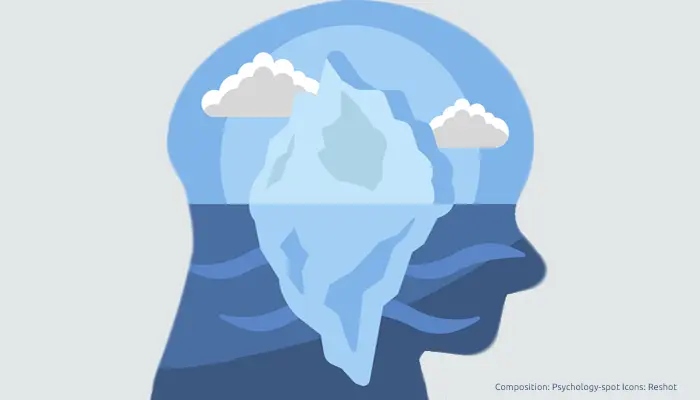
Our mind doesn’t stop, not even when we are sleeping. However, it is impossible to understand it if we do not understand the role of the unconscious. Freud understood this a century ago, so the unconscious played a fundamental role in his theory. In fact, much of the concept that we have formed about this psychic structure comes precisely from the father of psychoanalysis.
Freud thought that the unconscious was timeless, was free of contradictions, was regulated by psychological laws different from those of reason and was fundamentally moved by instinctive energy. He also believed that this unconscious, which remains largely inaccessible to consciousness, manifested itself through verbal lapses and dreams. And he was convinced that blocking his energy was what led to mental disorders.
His perspective has permeated our conception of the unconscious, turning it, especially in popular culture, into a dark reservoir of repressed impulses and repudiated and unspeakable desires. However, Erich Fromm had a different idea about the contents of the unconscious and believed that it was a much more luminous “space.”
Are we really guided by our rational conscience?
Fromm established a distinction between rational consciousness and the unconscious. In fact, he was convinced that apparently rational contents must also be subjected to deep analysis because they are not as logical, sensible or positive as we assume.
“Our motives, ideas and conscious beliefs are in reality a mixture made up of false information, preconceived ideas, illogical passions, rationalizations and prejudices on which float shreds of truth that give us security, although illusory, that it is a mixture real and true.”
“Thought tries to organize this sewer of illusions according to the laws of logic and plausibility, and we assume that this level of knowledge reflects reality, so it is the map we use to direct our lives,” when in reality it is just a small part of the world.
His statements may seem exaggerated, but Neuroscience proves him right. The human brain is capable of processing 11 million bits of information every second, but our conscious mind can only process approximately 50 bits per second. What happens with the rest of the information? How do we filter it? And, even more importantly, how do we use it?
A particularly revealing study carried out at the University of Leipzig and published in the prestigious journal Nature, concluded that our unconscious decides for us 10 seconds before we are aware of that decision.
By recording the electrical activity of the brain, these neuroscientists confirmed that the brain used to prepare for the action before the person consciously made the decision, which means that it could be created and made in the unconscious or, at least, the unconscious takes note and sends the signal before consciousness.
The underused power of unconscious knowledge
Fromm considered that the unconscious not only contains irrational passions – which would occupy only a small part – but also all knowledge of reality. He believed that our unconscious mind has infinitely greater power than consciousness – which is fundamentally a social construction – so it can warn us that one person is dangerous and another is trustworthy, tell us which is the best path to follow, help us detect the lies or pointing out when we are being manipulated or making mistakes.
Fromm was convinced that through the unconscious we can know everything we need to know to orient ourselves in life. However, we often repress these contents and do not pay attention to our intuition – which is one of the main means of expression of the unconscious – because socially this information is considered too “dangerous”.
In fact, he thought that the same society that produces consciousness and the different types of narratives in which we move also forces us to repress many of our unconscious knowledge, so that “The truth becomes a prisoner of the presumed rationality.”
Although we have deep unconscious knowledge – the result of the perception of reality as it is – we cannot process it or use it in its full magnitude, but rather we filter it through reason and other social structures.
When we are too immersed in society, we lose contact with the signals that the unconscious sends and we forget that reason is just one of the many manifestations of reality. Fromm believed that this type of learning is insidious because it generates the illusion of freedom, distancing us from knowledge and ourselves.
We believe that we act according to our own will because we think and make apparently rational decisions, so we are not able to see its high social and, therefore, external component. By feeling these decisions as our own, we do not realize that we are following a script, but rather we convince ourselves that this is the correct path or the only possible one.
Recovering contact with ourselves, which for Fromm involves reconnecting with our unconscious mind, is the way to find authentic freedom, expand our knowledge and, above all, know exactly what we want.
In short, it is about stopping “Allocating a large part of our energy to trying to hide from ourselves what we know”, as Fromm pointed out, a knowledge that, far from being a mass of dark and unspeakable contents, could be the door to know ourselves better and live in a much fuller way.
References:
Haynes, J. D. et. Al. (2008) Unconscious determinants of free decisions in the human brain. Nature Neuroscience; 11(5): 543-545.
Wiliam, D. (2006) The half-second delay: what follows? Pedagogy, Culture & Society; 14(1): 71–81.
Fromm, E. (2001) Avere o essere? Mondadori: Milano.




Leave a Reply